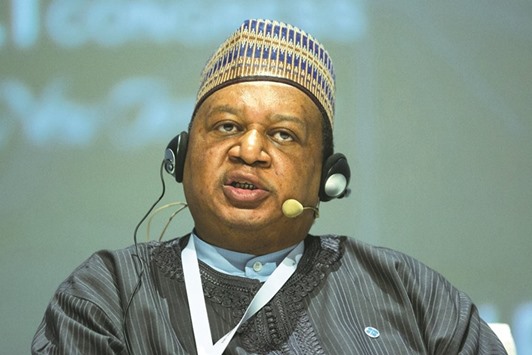Opec’s most senior official said the organisation and other major oil producers are “on course” to deliver a deal this month that will temper the global oversupply.
All of Opec’s 14 members as well as erstwhile rivals such as Russia are committed to finalising the agreement, to be completed when the group meets on November 30, Secretary-General Mohammed Barkindo said on Monday in a Bloomberg Television interview. Even Iraq, which has demanded an exemption from supply caps and vowed to increase production, is willing to play its part, he said.
Oil’s rally above $50 a barrel has faltered amid doubts that the Organisation of Petroleum Exporting Countries will make the supply cuts it pledged in Algiers in September as Iran, Iraq, Libya and Nigeria all seek to be excluded from the deal, while non-members such as Russia give equivocal signals of their support. At talks in Vienna last week, Barkindo warned of the consequences if producers don’t follow through on their agreement to reduce supply.
Opec made “significant progress” when technical experts from member nations gathered in the Austrian capital on Friday to work on details of the deal, and again when they met the following day with representatives from Azerbaijan, Brazil, Kazakhstan, Mexico, Oman and Russia, Barkindo said. It’s too early to say how much these non-member producers may be willing to cut, he added.
“Come November 30, we are optimistic that we are going to get the required supply cut that will go a long way in rebalancing this market,” Barkindo said. He insisted Iraq is “committed to the implementation of the Algiers accord” and said he’s “confident that our non-Opec friends will also contribute.”
Opec agreed on September 28 in the Algerian capital that it would reduce output to a range of 32.5mn to 33mn barrels a day - the first output cut in eight years - to hasten the balancing of the oil market.
The decision, which scrapped a two-year strategy of producing without restraint, would mean curbing the group’s output by as much 900,000 barrels a day.
Still, initial signs from the weekend’s discussions weren’t encouraging, with representatives from Brazil and Kazakhstan outlining plans to increase production on Saturday after talks concluded without any joint agreement.
While Russian President Vladimir Putin has pledged to cooperate, he’s been vague about whether the country will trim output or just freeze production at September’s post-Soviet record. Nonetheless, Opec is “satisfied” with Russia’s involvement in the process and considers the issue of reducing or simply capping as “mere semantics,” Barkindo said.
On October 28, Opec’s technical forum struggled to agree on how to allocate individual cuts amid disputes over the role Iran and Iraq ought to play, delegates said. On Sunday, Iraq disclosed more data on its oil fields to prove that Opec is underestimating the amount of crude it’s producing.
While Iran, Iraq and Venezuela have all disputed Opec’s assessments of their output, such differences won’t derail the accord, Barkindo said. Iraq, which faces difficulties in collecting output data because of security challenges, is making progress in reconciling its figures with Opec’s, he said.
Reports that some countries want to be excluded from output limits won’t prevent the deal either, according to the Opec chief.
“The decision in Algiers was an all-inclusive one,” he said. “The issue of exemption does not arise.”

Barkindo: Optimistic about the required supply cut that will go a long way in rebalancing the market.
